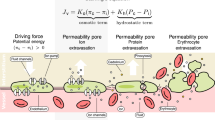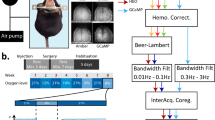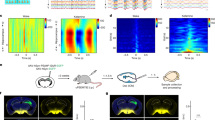Abstract
ALTHOUGH there is adequate evidence that anoxia can damage the brain, the precise method by which it does so is not known. It has been suggested that deprivation of oxygen can lead to death of the cell by direct action on the neurone itself1. However, an alternative mechanism has been postulated by Lindenberg, namely, that cerebral œdema follows anoxia and this in turn leads to interference with the blood supply of the nerve cells in certain vulnerable areas2.
This is a preview of subscription content, access via your institution
Access options
Subscribe to this journal
Receive 51 print issues and online access
$199.00 per year
only $3.90 per issue
Buy this article
- Purchase on SpringerLink
- Instant access to full article PDF
Prices may be subject to local taxes which are calculated during checkout
Similar content being viewed by others
References
Scholtz, W., Verh. deutsch. Ges. Kreislaufforsch., 19, 52 (1953).
Lindenberg, R., J. Neuropath., 14, 223 (1955).
Richardson, J. C., Chambers, R. A., and Heywood, P. M., Arch. Neurol., 1, 178 (1959).
Gunn, C. G., Williams, G. R., and Parker, I. T., J. Surg. Res., 2, 141 (1962).
Spector, R. G., Brit. J. Exp. Path., 42, 623 (1961).
Levine, S., Amer. J. Path., 36, 1 (1960).
Author information
Authors and Affiliations
Rights and permissions
About this article
Cite this article
HILLS, C., SPECTOR, R. Anoxia and Cerebral Water Content in the Adult Rat. Nature 199, 393 (1963). https://doi.org/10.1038/199393a0
Issue date:
DOI: https://doi.org/10.1038/199393a0
This article is cited by
-
Zum Energiestoffwechsel des Gehirns
Zeitschrift f�r Vergleichende Physiologie (1971)
-
Energetische St�rung des Kationentransports als Ursache des intrazellul�ren Hirn�dems
Acta Neurochirurgica (1970)
-
Cerebral Composition and Function in Experimental Brain Injury in the Rat
Nature (1967)



